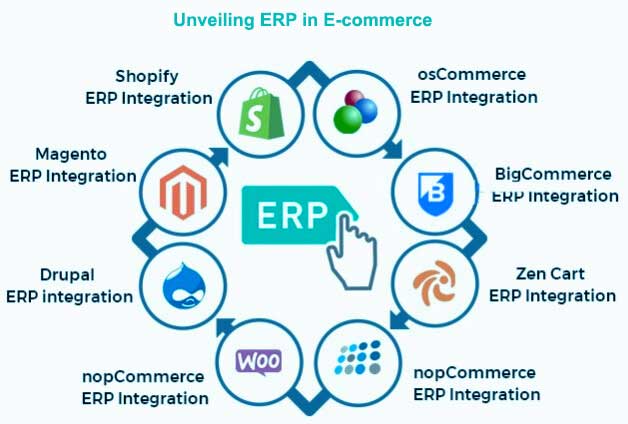In the fast-paced realm of e-commerce, where agility and efficiency are paramount, integrating Enterprise Resource Planning (ERP) systems proves to be a game-changer.

This article explores the symbiotic relationship between ERP and e-commerce, shedding light on how this integration enhances operational efficiency and drives business success.
Unveiling ERP in E-commerce
Integration for Operational Harmony
ERP in e-commerce refers to the integration of comprehensive ERP systems with e-commerce platforms. This integration aims to streamline business processes, from order management to inventory control and financial tracking.
Addressing E-commerce Challenges
E-commerce poses unique challenges, such as managing large volumes of transactions, maintaining accurate inventory levels, and ensuring seamless order fulfillment. ERP systems are designed to address these challenges by providing a centralized solution.
Key Features of ERP in E-commerce
Unified Order Management
ERP in e-commerce consolidates order management, ensuring that orders from various online channels are seamlessly processed, tracked, and fulfilled.
Real-Time Inventory Visibility
Integration with ERP provides real-time visibility into inventory levels, preventing stockouts, minimizing overstock situations, and optimizing order fulfillment.
Financial Tracking and Reporting
ERP systems enable accurate financial tracking, automating processes such as invoicing and reconciling transactions. This ensures financial transparency and facilitates robust reporting.
Customer Relationship Management (CRM) Integration
CRM integration allows e-commerce businesses to manage customer relationships effectively, providing personalized experiences and fostering customer loyalty.
The Benefits of ERP in E-commerce
Enhanced Efficiency
By centralizing data and automating processes, ERP in e-commerce significantly enhances operational efficiency, reducing manual work and potential errors.
Scalability
As e-commerce businesses grow, the scalability of ERP systems allows them to adapt seamlessly, accommodating increased order volumes and expanding product catalogs.
Data-Driven Decision-Making
ERP systems provide valuable insights through analytics, empowering e-commerce businesses to make informed, data-driven decisions for strategic planning.
Improved Customer Experience
Efficient order processing, accurate inventory information, and personalized customer interactions contribute to an improved overall e-commerce customer experience.
Implementing ERP in E-commerce
Platform Compatibility
Selecting an ERP system compatible with the chosen e-commerce platform is crucial to ensure seamless integration and optimal performance.
Data Migration and Integration
Smooth data migration and integration processes are essential for transferring existing e-commerce data into the ERP system without disruptions.
Staff Training
Comprehensive training for e-commerce staff on using the integrated ERP system ensures that they can maximize its features for efficient daily operations.
Conclusion
In the dynamic world of e-commerce, where customer expectations are high and competition is fierce, the integration of ERP systems emerges as a strategic advantage. By streamlining order management, providing real-time inventory insights, and fostering data-driven decision-making, ERP in e-commerce contributes to operational excellence and business growth. As the e-commerce landscape continues to evolve, embracing the synergy between ERP and online retail becomes not just advantageous but essential for staying ahead in the competitive market.